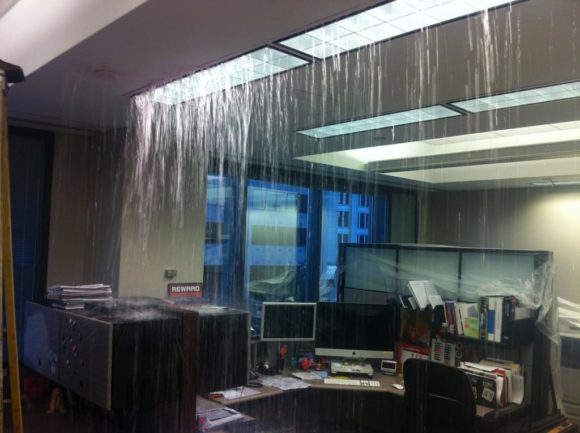This article is part of a sponsored series brought to you by The Detection Group. View Series
This post is part of a series sponsored by The Detection Group.
Gravity is not your friend when it comes to leaking water. Water always seeks the lowest point in nature, and in commercial structures,” notes Laurie Conner, President & CEO of The Detection Group®.
In a commercial, multi-story building, you can ‘chase’ the origin of a leak for hundreds of feet across, then up and down any number of 20,000 square foot floorplates before you locate the leak source. You’ll find spaces in your building you never knew existed, all the while the leak continues its drip, drip, drip waiting to become a flood. And your worst friend ever, mold, is sinking its ugly tentacles into drywall, carpets, cabinets, and ceiling tiles. Insurance companies are acutely aware of the issue as they pay out on over $10 billion annually in water damage claims – more than fire and theft combined.

One such insurance company, FM Global, through its internationally recognized testing laboratories, FM Approvals, recently updated their FM Approval Standard 7745 to better accommodate leak detection systems for water and hydrocarbons. They included strict standards for the application of 21st century, IoT wireless technology for identifying water leaks in commercial buildings.
At The Detection Group, we applaud FM Approvals for introducing more stringent standards for remote wireless leak detection. Not just because The Detection Group’s Trident™ Wireless Water Leak Detection platform is the first and only system to receive FM Approval, but because Trident wireless leak detection and remote monitoring of water leaks is the future. Here is why:
- The Trident cloud-based, IoT wireless system is easy and inexpensive to install in any size or age of building. Modular systems are perfect for retrofitting in older buildings where leaks may be more prevalent.
- Valuable engineering time will be saved because the ‘chase’ to find the leak is over quickly. Trident’s technology lets you know precisely what is leaking and where to find it. The Trident system also has optional auto-shut off capabilities which instantly stops water supply to the leak.
- Building owners will save the amounts paid for damage deductibles and lost tenant income, allowing for a positive ROI on the cost of the system. Insurance company damage losses will also be reduced dramatically, ensuring loss ratios will be low and in-line with stated risk management objectives.
- Minimizing water damage claims not only saves carriers and insureds money, but critically allows continuation of insurance coverage at normal property rates versus rates that reflect losses from water damage.
- Remote monitoring with the Trident platform means critical personnel are notified, day or night, whether they are working from home or while they are on property, whenever there is a water event taking place.
- Leaks are reported and fixed immediately, verifying to insurance carriers they are ‘sudden and accidental’ and have not been an ongoing, deferred maintenance which might negate payment of some future claim.
- There is increasing interest by insurance carriers to make wireless water leak detection systems a policy prerequisite, even recommending Trident as an approved system and perhaps granting premium discounts when the system is installed.
- The Detection Group is not only focused on detecting and fixing water leaks quickly but enhancing water conservation and reducing water utility bills for building owners, property managers and tenants.
Every facility should have a Trident wireless water leak detection system. Water leaks are a universal problem that almost every property manager or building owner has experienced. Interior water damage can result anywhere water flows in a building, including plumbing; boilers; water tanks; HVAC systems; sprinklers; fire risers: toilets; restroom and kitchen sinks; ice makers and refrigerators – anything that has a water supply.
Three weeks after the installation of a Trident wireless water leak detection system in a 38-story office building in San Francisco, the building engineer called to tell us he received an alert at 5:30pm on a Friday afternoon. A toilet was overflowing in a 17th floor restroom, which was not equipped with a floor drain. The engineer believed the water would have migrated down to the lobby before anyone discovered the overflow. By preventing one disaster, the Trident system paid for itself many times over.
Be prepared. If you have experienced a catastrophic water event you know how disastrous and expensive it can be. If you haven’t, odds are you will. There is no reason you should have to with The Detection Group’s Trident wireless, remote sensing technology that can be installed in any size or age building.
Learn more about The Detection Group’s Trident System at thedetectiongroup.com
Was this article valuable?
Here are more articles you may enjoy.

 Uber Jury Awards $8.5 Million Damages in Sexual Assault Case
Uber Jury Awards $8.5 Million Damages in Sexual Assault Case  Cape Cod Faces Highest Snow Risk as New Coastal Storm Forms
Cape Cod Faces Highest Snow Risk as New Coastal Storm Forms  Founder of Auto Parts Maker Charged With Fraud That Wiped Out Billions
Founder of Auto Parts Maker Charged With Fraud That Wiped Out Billions  Canceled FEMA Review Council Vote Leaves Flood Insurance Reforms in Limbo
Canceled FEMA Review Council Vote Leaves Flood Insurance Reforms in Limbo 